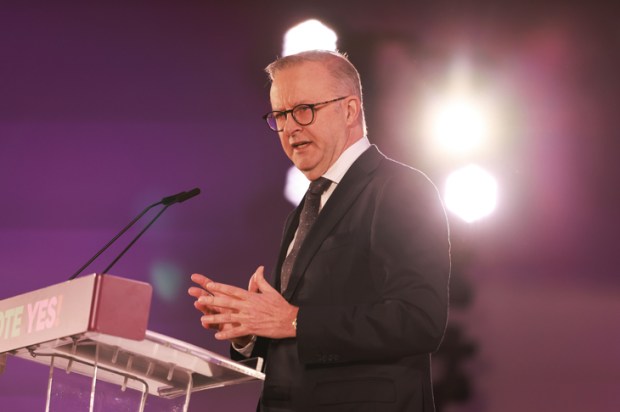In late 2020, Qantas outsourced the work of almost 1,700 ground services staff. When the Transport Workers’ Union won its case against the decision in the federal and full federal courts, Qantas appealed to the High Court which on 13 September unanimously ruled that Qantas had acted unlawfully. Qantas faces costs and penalties of over $200 million. Meanwhile the ACCC has launched legal proceedings against it for defrauding the public in regard to cancelled flights and wants a $250 million fine. Yet, the Albanese government has chosen to protect Qantas by denying an additional 21 weekly flights to Qatar Airways which, unlike Qantas, kept planes flying throughout the pandemic to bring home thousands of stranded Australians. Of course, like membership of the Chairman’s Lounge for the PM’s son, this has nothing to do with the mateship between the PM and the former CEO. The TWU secretary says the board should ‘strip Alan Joyce of his bonuses and follow him out the door’. Albanese says he neither made the decision nor was involved in it.
The Qatar decision has been criticised by competitor airlines, other businesses and opposition parties. Having failed to register the public animosity towards Qantas based on high fares, poor service, arrogance and high-handedness, Albanese risks cementing the perception of a government of out-of-touch elites tone-deaf to cost-of-living pressures. Analyses by the Australian Financial Review and Guardian Australia reveal six to eight distinct justifications. Meanwhile Albanese continues in parliament with school-level performative witticisms (‘I can confirm that the Education [Environment, Energy] Minister did not ring me up to tell me that nothing was happening’ while I was overseas).
Transport Minister Catherine King says her decision is in ‘the national interest’. Yet, the ‘national interest’ is conceptually incoherent. It’s erroneous as a description of the empirical reality of the complexities of decision-making, substitutes tautology for explanation and is unhelpful as a guide to policy. By definition, it fails to cover non-state actors on the world stage like Pfizer, the World Health Organisation, the Gates Foundation, Facebook, Twitter, Bill Gates and Klaus Schwab. By contrast, ‘a balance of interests’ covers all groups. In a world in which states are no longer the only important actors in global affairs, security is not the only major outcome that they seek and force is not always the best instrument available to achieve those outcomes, we need to study and understand the balance of tools, outcomes and actors. States themselves are multipurpose entities pursuing multiple goals for a diverse range of actors and many different interests.
‘A balance of interests’ also better captures human agency and allows for human error and multiple balances as weighed by different people reflecting their personal predilections, professional backgrounds, life and career experiences, and institutional interests and perspectives. It is more resistant to being conflated into partisan pursuit and regime survival. It certainly helped me to argue for the broader set of considerations in getting policy settings right on Covid, balancing the risks of Covid against other grave health risks and balancing health goals against mental health, economic, employment and social goals. By contrast ‘the national interest’ can easily be corrupted into suppressing criticism as mis- or dis-information and delegitimising difference and dissent as anti-national to harass, imprison and eliminate critics and opponents.
When making decisions, governments must strive for a balance among different sectors and groups domestically and internally, among different nations and groups internationally and present and future generations temporally, and between interests and values. They must look to balance the interests of consumers, producers and manufacturers; of importers, exporters and retailers; between economic growth, resource conservation and environmental protection within and among nations; between the need to protect vulnerable domestic sectors against powerful global firms and the efficiency and price gains of promoting a competitive economy; between government regulation and the free market; between market and social policy; between the developmental growth priority of poor countries and global labour, human rights and environmental standards; between the carrot of aid and the stick of sanctions; and so on.
For example, sales of military hardware may be of commercial benefit to the company making and exporting the products, of employment benefit to the workers in the city and state where the factory is located, to the political benefit of the representatives from that electoral district, and to the security benefit of the exporting country if the recipient country is a critical ally whose military capabilities are thereby enhanced. But it could be damaging to other political goals if the recipient country is ruled by a despot and the equipment is used to brutalise citizens in order to stifle protests and demands for democracy, human rights and political freedoms. It could be damaging to the global campaign to combat corruption if the deals are finalised through bribes or other blurring of the public–private boundary. It could damage relations with third countries if the weapons are deployed against them: think India-Pakistan. If there is a change of regime or circumstances, the recipient country or group – Osama bin Laden comes to mind – could become an enemy and turn arms, finance and training on the supplier country.
This explains why King’s generic ‘national interest’ justification falls apart. Domestic airlines argue that it’s in the national interest to restrict competition in the home market to protect them from foreign carriers whose governments may have deeper pockets, whose own home markets may be protected, whose labour costs may be significantly lower, whose access to fuel prices may be significantly advantageous, etc. The airline’s employees may support continued restrictions in order to protect their jobs and service conditions. But the resulting restriction of competition and labour market rigidity will push up costs and prices and lower benefits to consumers and therefore can hardly be said to be in their interest.
Like Albanese’s infamous question in relation to not having read the full Uluru Statement – ‘Why would I?’ – King did not seek advice from Treasury or the Department of Trade before announcing her decision on 19 July. The claim to job protection is risible against the 1,700 outsourced jobs, Virgin Australia employees and the thousands of workers in the tourism sector. King has also cited reducing emissions and the bodily inspections of Australian women at Doha airport in 2020 as factors in her decision. Both these contradict her suggestion that Qatar could increase flights to other Australian airports.
The Senate decision to hold an inquiry to get to the bottom of the decision will ensure continued coverage of the story for some time yet.
Got something to add? Join the discussion and comment below.
You might disagree with half of it, but you’ll enjoy reading all of it. Try your first month for free, then just $2 a week for the remainder of your first year.













